Thanks to Our Volunteers! – April 2025 Community Wildlife Chapter Updates
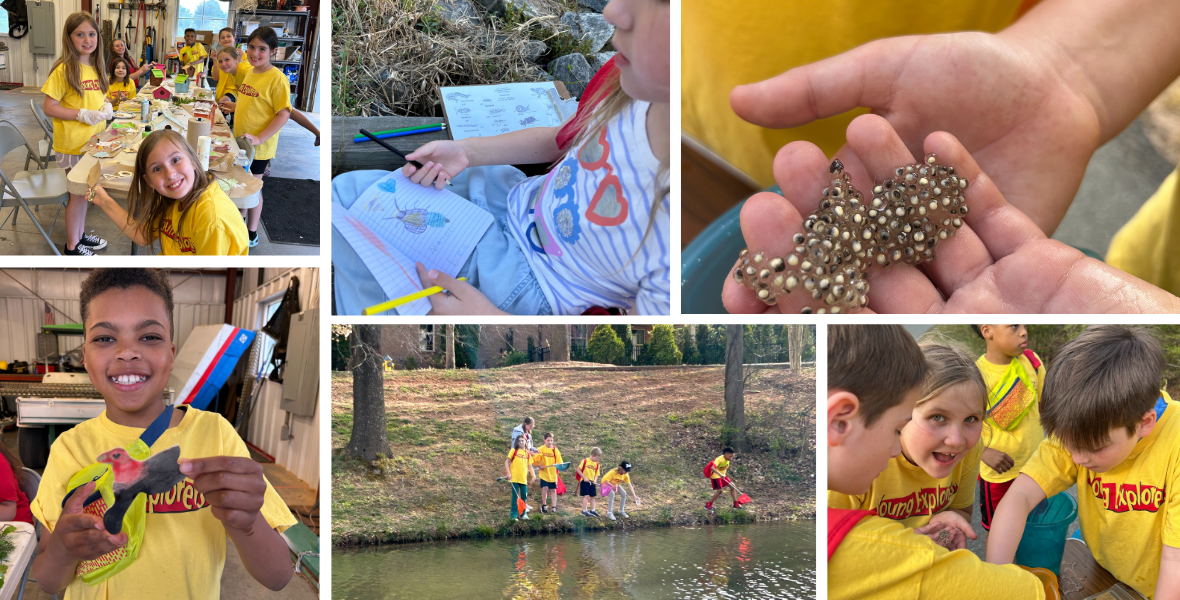
North Carolina Wildlife Federation staff and Community Wildlife Chapter volunteers were in full swing throughout the month of April, they connected people to the outdoors via paddles and outings, native tree and pollinator plant planting, litter pickups, and invasive species removals. In April, 600 people were given the opportunity to connect with nature through one of NCWF’s events. This month throughout our great state, 5,000 lbs of litter were removed from the landscape, 250 native trees and shrubs were planted, 738 native pollinator plants were sowed in the ground, and 4.1 acres of land were cleared of invasive plant species by NCWF Community Wildlife Chapters and partners.
Thanks to partners such as the Duke Energy Foundation, Jandy Ammons Foundation, and Burt’s Bees for helping make these habitat restoration workdays, educational programs and nature outings possible. Explore our Events Calendar to discover where NCWF and our Community Wildlife Chapters are hosting in-person and virtual events near you. Check out a few highlights below from our conservation outreach team.
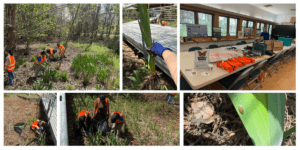
April 3, Invasive Iris Removal with Columbia High School: Columbia High School students and staff joined NCWF and Pocosin Lakes NWR for an invasive species removal project at the refuge visitor center. Volunteers helped remove invasive yellow-flag irises that have been dried to use for an upcoming community iris basketry class with the local art council.
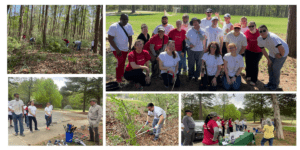
April 4, Charlotte EarthShare volunteer challenge: NCWF led the 2025 Charlotte EarthShare volunteer challenge in partnership with Bank of America at James Boyce Park to celebrate Earth Day. Volunteers from Mecklenburg County, Bank of America, and NCWF Charlotte Wildlife Stewards Chapter cleared 2.5 acres of invasive autumn olive in just under two hours.
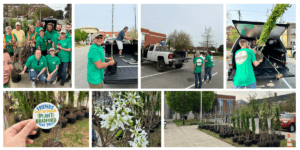
April 5, Elizabeth City Bradford Pear Bounty: NCWF and NCWF Wildlife Habitat Stewards of Northeastern NC Chapter participated in Elizabeth City’s first ever Bradford Pear Bounty tree exchange! The North Carolina Bradford Pear Bounty program is a collaboration between NCWF, the NC Urban Forest Council, the NC State Extension, and NC Forest Service. Folks from across the region came out to receive their native trees in exchange for removing invasive bradford pear trees from their property. Over 75 trees were exchanged!
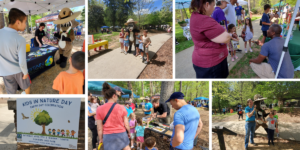
April 5, Earth Day With Kids in Nature Day: NCWF Habitat and Wildlife Keepers Chapter hosted their annual Earth Day with Kids in Nature Day. Kids participated in STEAM activities, fishing, and nature scavenger hunts. Local like-minded vendors educated the public about the important work their organizations do! Families took home rain barrels, bee hotels, and lots of prizes. Even Ranger Rick joined in the fun!
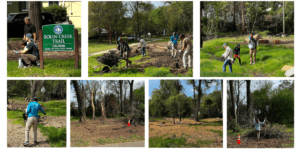
April 5, Tri-County Volunteer Workday with Chapel of the Cross: NCWF Tri-County Conservationists partnered with Chapel of the Cross and the Town of Chapel Hill Parks and Rec for a workday at the Chapel Hill Community Center. Volunteers helped remove invasive plants, create paths and beds for native plants, clear piles of debris (the result of previous invasive removal workdays!), and spread native plant seed and straw at the entrance to the Bolin Creek Greenway. Many thanks to volunteers that helped transform this space in just under 3 hours!
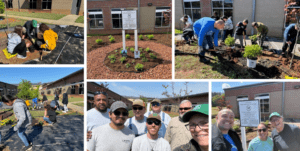
April 8, Rocky River Elementary Pollinator Pitstop: NCWF Habitat Builders Chapter was hard at work educating the community at Rocky River Elementary School about the importance and benefits of pollinators. Working alongside teachers, staff, and over twenty fifth graders, Habitat Builders installed 83 native pollinator plants and added a rock path to the Rocky River Elementary Time Capsule Garden.

April 10, Patagonia SOS Letter Writing: In partnership with Patagonia, the NCWF Charlotte Wildlife Stewards Chapter hosted an advocacy event at Patagonia Charlotte. Including letter writing to legislators, social media, and our online call to action, over 30 folks took action to Save Our Sounds. Birdsong donated free beer, and Patagonia provided some awesome raffle prizes for the event!
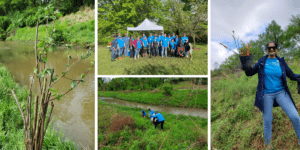
April 11, Duke Energy Habitat Enhancement: NCWF partnered with Duke Energy and Charlotte Mecklenburg Storm Water Services to enhance wildlife habitat and restore streambanks along Stewart Creek in Charlotte. Volunteers planted several hundred trees and live stakes, including river birch and silky dogwood.
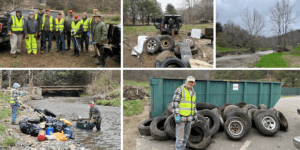
April 12, North Fork Cleanup: The North Carolina Wildlife Federation in partnership with New River Conservancy, Keep Ashe Beautiful, Keep North Carolina Beautiful, State Employees’ Credit Union, and the Ashe County Marine Corps League cleaned up 2,000 pounds of trash along with 1,530 pounds worth of tires along a quarter mile stretch of the New River with the help of 36 volunteers. Trash and debris in waterways create a host of problems for wildlife including entanglement, ingestion, habitat contamination, and degraded water quality. Cleanup efforts are vital in keeping our waterways clean and maintaining suitable habitat for wildlife.
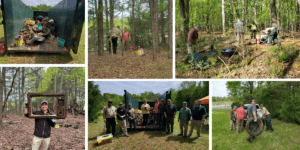
April 12, Spring Litter Sweep: NCWF Union County Wildlife Chapter teamed up with Union County Solid Waste, NC Forest Service, and Union County Parks and Recreation to remove litter and debris from an illegal dumpsite at Jesse Helms Park in Wingate. Volunteers removed glass, tires, plastic, old clothes, and even part of a TV. This two-day effort removed nearly 5,000 lbs of trash from wildlife habitat.
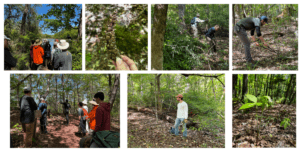
April 13, Tri-County White Pines Nature Walk and Invasive Removal: NCWF Tri-County Conservationists Chapter partnered with the Triangle Land Conservancy to host a nature walk and invasive plant removal at White Pines Preserve in Sanford. The afternoon began with a walk through the preserve, observing the many ephemeral plants along the bluff and the plentiful wildlife at the confluence of the Rocky and Deep Rivers. After the hike, volunteers helped remove a thick grove of autumn olive creating a symphony of coughing and sneezing as they restored habitat for wildlife!
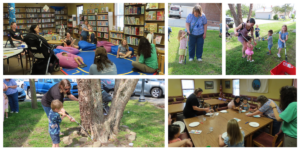
April 15, Earth Month Storytime with Tyrrell County Library: NCWF and Pocosin Lakes NWR teamed up with Tyrrell County Library for an opportunity to engage our youngest conservationists for earth month! We read stories that taught valuable lessons about why we need to take care of nature before a fun craft and litter cleanup activity behind the library.
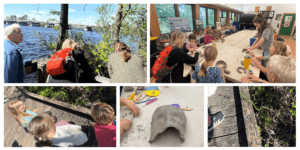
April 16, Toad Abodes with Pocosin Arts: NCWF, Pocosin Lakes NWR, and Pocosin Arts School of Fine Craft partnered to offer an educational family program on toads where participants of all ages had the opportunity to create their own clay toad abode.
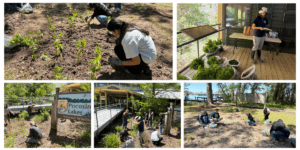
April 17, Educational Pollinator Garden Planting at Pocosin Lakes NWR: NCWF Wildlife Habitat Stewards of Northeastern NC Chapter teamed up with Pocosin Lakes National Wildlife Refuge and Columbia High School students to plant a native pollinator garden at the refuge visitor center. Students and volunteers worked together to plant over 600 native plants, representing 11 different species including swamp milkweed, scarlet rosemallow, pickerel weed, blue mistflower, and cardinal flower.
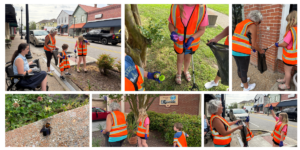
April 22, ecoEXPLORE Plant Walk & Litter Cleanup: NCWF and Pocosin Lakes NWR partnered with Tyrrell County Library for this month’s ecoEXPLORE program with a focus on pollinators and plants. While searching for plants and pollinators to identify, participants gave back to their community in honor of Earth Day by removing litter along the way!

April 22, A.C. Reynolds Middle School Water Properties Day: The North Carolina Wildlife Federation alongside the City of Asheville, Buncombe County, and fellow conservation organizations created an immersive learning experience for 175 8th grade students. Students explored the natural world through interactive, hands-on activities aligned with the eighth-grade science curriculum. Instead of simply reading about the water cycle or pollution, students watched it happen, creating watershed models, simulating pollution runoff with sprinkles and syrup, building bird nests to understand the connection between wildlife and habitat, and observing real macroinvertebrates under microscopes. They learned how fertilizers, factory runoff, and suburban waste can all flow into shared water sources, affecting everyone in a community.
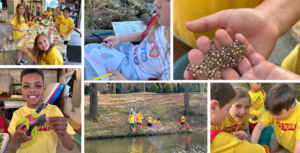
April 22, Young Explorers: NCWF Lake Norman Wildlife Conservationists Chapter completed another successful session of Young Explorers this month. Children ages 7-11 spent the last month investigating creatures that live in the soil, identifying local birds and plants, and casting for catfish and bream in the turtle pond at Robbins Park! Kids enjoyed nature journaling, crafting, and much more!
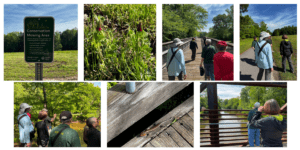
April 23, NRHC Nature Walk: NCWF Neuse River Hawks Conservationists Chapter went on a nature walk along the Neuse River Greenway Trail to the Smith Creek Greenway. The group began their walk on the Neuse River Greenway, crossed one of the largest pedestrian bridges in the state spanning the Neuse River, and then walked along the Smith Creek Greenway. Chapter leaders pointed out plants like dog bane as well as a number of invasives including multiflora rose (which was flowering), English ivy, and Japanese honeysuckle. Wildlife viewing was plentiful with participants spotting a Broad-headed skink, a Great Blue heron, and Easter tiger swallowtails.
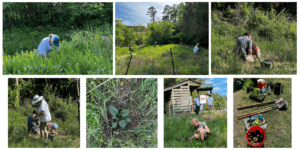
April 23, Tri-County FLOHA Planting: NCWF Tri-County Conservationists Chapter partnered with Friends of the Lower Haw River to add some native plants to their pollinator garden in the Lower Haw River State Natural Area. It was hard work, but volunteers helped plant over 40 native plants to add more diverse food and shelter for wildlife.
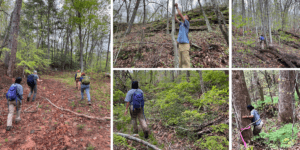
April 24, Cerulean Warbler & Avian Diversity Study: The North Carolina Wildlife Federation joined partners in the field to help with a cerulean warbler and avian diversity survey project focused on the last remaining patches of old-growth forests and maturing second-growth forests within the Craggie Mountains – Pisgah National Forest where presence of ceruleans and many other avian species is largely unknown. The crew installed Acoustic Recording Units (ARU’s) at various locations. Read more about the project HERE.
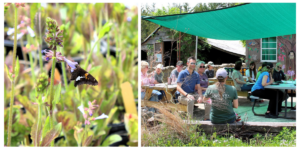
April 25, Introduction to Designing for Wildlife with Native Plants: NCWF Wildlife Habitat Stewards of Northeastern NC Chapter partnered with Southern Branch Nursery for an inspiring workshop exploring how to create a garden that nurtures our local wildlife through the use of native plants. Participants learned more about the benefits of native plants and their role in supporting ecosystems, tips for selecting the perfect plants for your unique habitat, garden design principles for creating wildlife-friendly spaces, and tips for sustainable gardening practices.
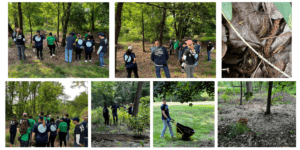
April 25, EarthShare: NCWF led the 2025 Triangle EarthShare volunteer challenge in partnership with Greenology at Elderberry Wood (part of the Woodcroft neighborhood) in Durham to celebrate Earth Day. Volunteers from Greenology and NCWF Durham Wildlife Stewards Chapter planted over 100 native sedges and pollinator plants, removed invasive plants, and created a trail through the garden with fresh mulch and downed limbs.
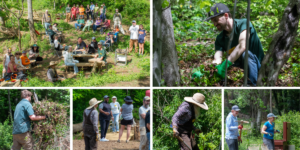
April 27, Fox Creek Park Workday: The Friends of Fox Creek Park and North Carolina Wildlife Federation worked at Fox Creek Park in Swannanoa. Hurricane Helene flooded Fox Creek with a torrent of muddy water and debris, and as the surge retreated the park was left with scattered trash, re-made stream beds, and a heavy deposit of silt covering much of the park. The workday included invasive removal, trail clearing while volunteers spotted a variety of wildlife including red-shouldered hawks, wood thrushes, and plenty of elderberry. Afterwards, the group gathered for food to celebrate the park and the return of spring. 40 volunteers joined the fun!
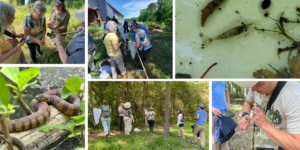
April 27, Charlotte BioBlitz: NCWF Charlotte Wildlife Stewards Chapter teamed up with Central Carolinas Master Naturalists for a bioblitz during the City Nature Challenge. The City Nature Challenge is an effort to record biodiversity in cities across the globe using iNaturalist. Wildlife observations included a white throated vireo, Fowler’s toad, American lady butterfly, and a northern watersnake.
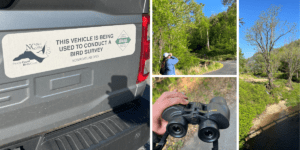
April 28, NC Bird Atlas Outing: The North Carolina Wildlife Federation and the North Carolina Wildlife Resources Commission met in the field to complete a priority block. The NC Bird Atlas is a statewide community science project to map birds during the breeding and wintering seasons. The goal of the bird atlas is to help us understand the current and future distribution and abundance of our state’s birds. Having this detailed picture as a result of the atlas will be an incredibly important source of data moving forward to make more informed management and conservation decisions across the state.
Written by:

– Page Turner, Conservation Coordinator
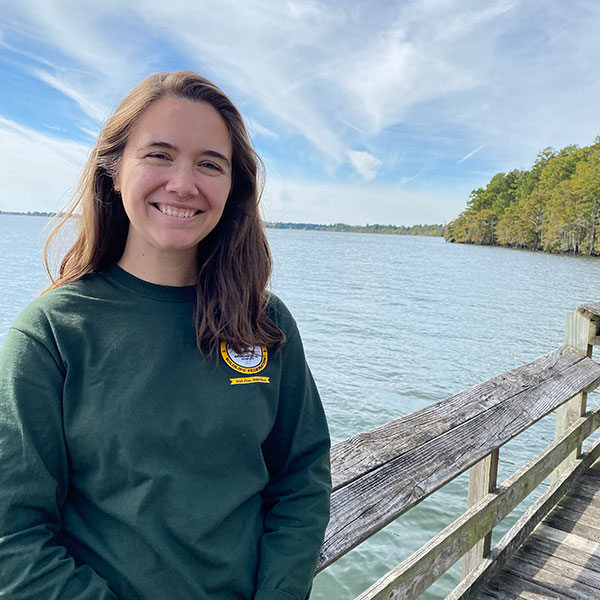
– Laura Frazier, Refuge Conservation Coordinator

– Natalie Bohorquez, VP of Conservation Partnerships
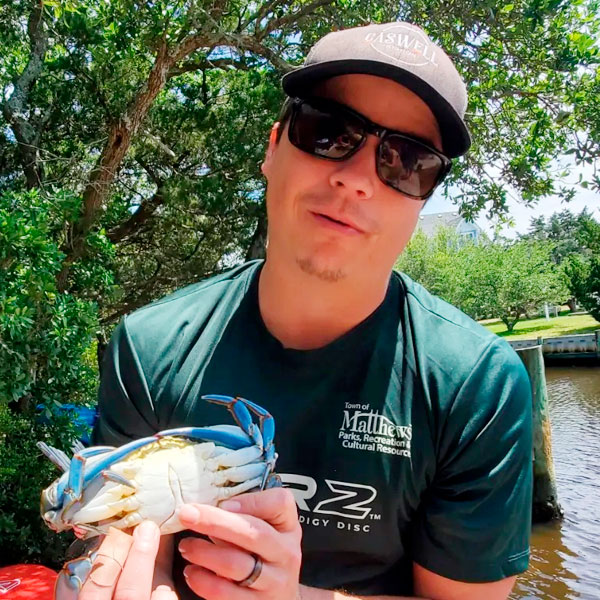
– Alden Picard, Conservation Coordinator

– Kara Solomon, Conservation Coordinator

– Luke Bennett, NCWF Conservation Coordinator

